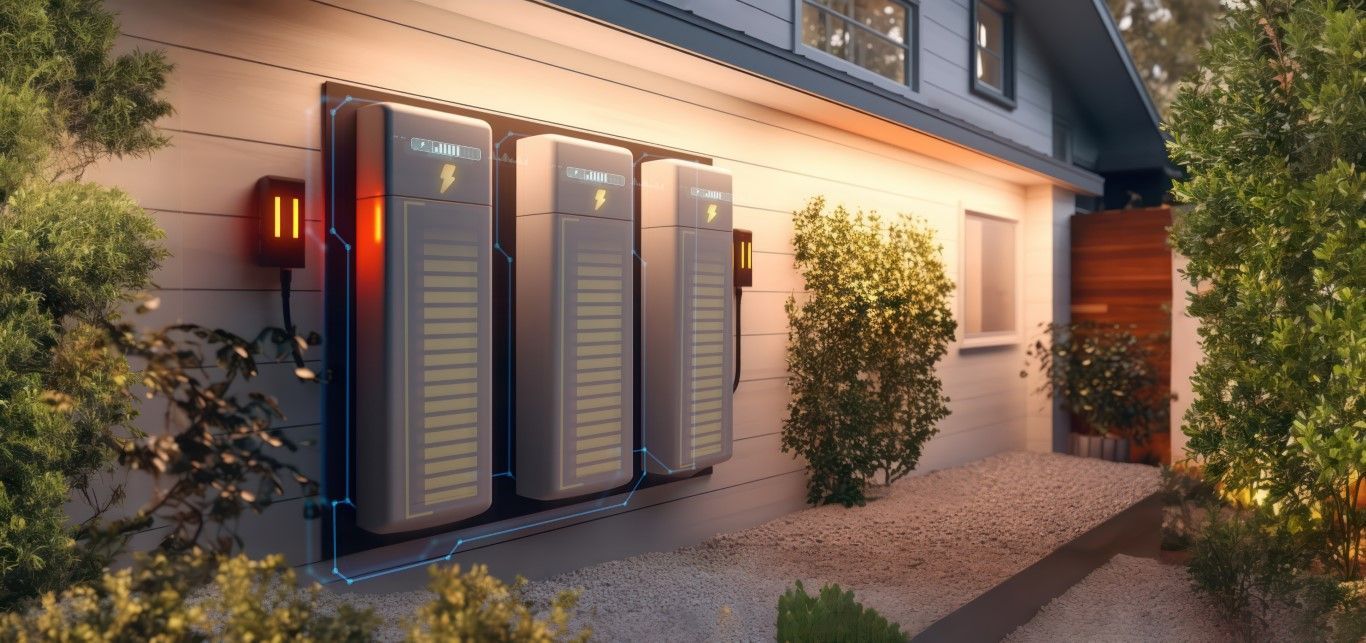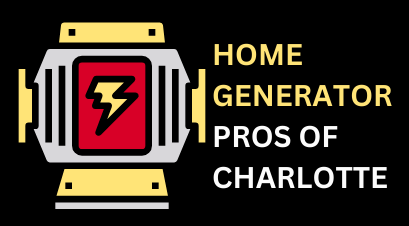Solar Generators in Charlotte NC
Solar generators are devices that convert sunlight into electrical power. They work by using solar panels to capture sunlight and convert it into electricity through photovoltaic cells. This electricity is then stored in batteries for later use or can be used directly to power devices and appliances. Unlike traditional generators that run on fossil fuels, solar generators harness the power of the sun, making them a clean and efficient energy source.
Basic Components
A typical solar generator consists of several key components:
- Solar Panels: These are the main component responsible for capturing sunlight and converting it into electricity.
- Charge Controller: This device regulates the voltage and current coming from the solar panels to prevent overcharging of the batteries.
- Battery Bank: The batteries store the electricity generated by the solar panels. They come in various sizes and capacities, depending on the generator's intended use.
- Inverter: This converts the stored DC (direct current) power from the batteries into AC (alternating current) power, which is used by most household appliances.
- Cabling and Connectors: These components link the solar panels, batteries, and inverter, ensuring the efficient flow of electricity.
Types of Solar Generators
Solar generators come in different types, catering to various needs and preferences:
- Portable Solar Generators: These are compact and easy to transport, making them ideal for camping trips or emergency backup power.
- Home Solar Generators: Designed for residential use, these generators can power entire homes or specific appliances during outages or as a supplementary power source.
- Commercial Solar Generators: Larger and more powerful, these generators are used by businesses to reduce their reliance on the grid and lower energy costs.
Applications and Uses
Solar generators are versatile and can be used in numerous applications:
- Emergency Backup Power: They provide a reliable power source during power outages, ensuring that essential appliances like refrigerators and medical equipment remain operational.
- Outdoor Activities: Ideal for camping, hiking, or tailgating, solar generators can power small devices and appliances, such as laptops, phones, and portable refrigerators.
- Off-Grid Living: For those living in remote areas without access to the grid, solar generators offer a sustainable and independent energy solution.
- Commercial Use: Businesses use solar generators to supplement their energy needs, reduce operating costs, and lower their carbon footprint.

Why It Is Popular
The popularity of solar generators is driven by several factors:
- Environmental Benefits: They provide a clean, renewable source of energy, reducing greenhouse gas emissions and dependence on fossil fuels.
- Cost Savings: Solar generators can lower electricity bills by reducing reliance on the grid. Over time, they offer significant savings compared to traditional energy sources.
- Portability: Portable solar generators are convenient for outdoor enthusiasts and those who need a backup power source.
- Technological Advancements: Improvements in solar technology and battery storage have made solar generators more efficient, affordable, and accessible.
Importance of Renewable Energy Solutions
Renewable energy solutions, like solar generators, are crucial for addressing global energy challenges. They help reduce environmental impact by cutting down on greenhouse gas emissions and pollutants. Additionally, they support energy independence and security by diversifying energy sources and reducing reliance on finite resources. As the demand for clean energy grows, renewable solutions play a vital role in building a sustainable future.
Cost Analysis
The cost of solar generators can vary based on factors such as size, capacity, and brand. Here’s a general breakdown:
- Portable Solar Generators: Typically range from $200 to $1,500. Their cost depends on the battery capacity and the power output.
- Home Solar Generators: These systems can range from $2,000 to $10,000 or more, depending on the power requirements and the number of panels and batteries.
- Commercial Solar Generators: Prices can exceed $10,000, reflecting their larger capacity and higher power output.
While the initial investment may seem high, the long-term savings on energy bills and the benefits of clean energy can offset these costs over time.
Financial Incentives
Several financial incentives can help offset the cost of solar generators:
- Federal Tax Credits: The Investment Tax Credit (ITC) allows homeowners and businesses to deduct a percentage of the cost of installing solar systems from their federal taxes.
- State Incentives: Various states offer additional rebates, tax credits, or grants for solar energy systems. North Carolina, for example, provides incentives that can reduce the overall cost of solar installations.
- Utility Company Programs: Some utility companies offer incentives or rebates for installing solar generators, which can further reduce costs.
If you're interested in exploring
solar generator options in Charlotte, NC, or if you have any questions about how solar energy can benefit you, feel free to contact us today. Our team of experts is here to provide you with information, answer your questions, and help you find the best solar solution for your needs. Reach out to us to get started on your journey to clean, efficient energy!
Installation Requirements for Home Solar Generators
In today’s world, where energy efficiency and sustainability are becoming increasingly important, home solar generators offer an effective solution. These systems harness the power of the sun to provide clean, renewable energy for your home. However, installing a solar generator system involves several key requirements and considerations to ensure optimal performance and compliance with local regulations. Understanding these requirements is crucial for a successful installation and for maximizing the benefits of your solar energy system.
Assessing Your Home’s Solar Potential
Before installing a solar generator system, it's essential to evaluate the solar potential of your home. This involves assessing how much sunlight your property receives throughout the year. Factors such as the angle of your roof, shading from trees or buildings, and the orientation of your home affect solar efficiency. A professional solar installer can conduct a site assessment to determine the best placement for your solar panels and ensure they receive adequate sunlight.
Choosing the Right Solar Generator System
Solar generator systems come in various sizes and capacities, so selecting the right one depends on your energy needs and budget. Consider the following when choosing a system:
- Energy Consumption: Calculate your household's average energy usage to determine the size of the solar generator you need.
- Panel Type: Different types of solar panels (monocrystalline, polycrystalline, and thin-film) offer varying levels of efficiency and cost.
- Battery Storage: Decide if you need battery storage to store excess energy for use during cloudy days or nighttime.
Checking Local Regulations and Permits
Installation of solar generators is subject to local regulations and building codes. Before proceeding, check with your local authorities to ensure compliance with zoning laws, building permits, and any other regulations. Some areas may have specific requirements for the installation of solar panels, such as structural modifications or electrical code compliance.
Preparing the Installation Site
Once you have selected a solar generator system, preparing the installation site is crucial. This may involve:
- Roof Preparation: Ensure your roof is in good condition and can support the weight of the solar panels. In some cases, roof repairs or reinforcements may be necessary.
- Electrical System Upgrades: Your home’s electrical system may need upgrades to handle the new solar system. This could include installing a new inverter or updating your electrical panel.
Hiring a Professional Installer
While some DIY enthusiasts might consider installing a solar generator system themselves, hiring a professional installer is highly recommended. Professionals have the expertise to handle complex installation tasks, ensure the system is installed correctly, and comply with all safety and regulatory standards. They can also assist with obtaining necessary permits and inspections.
Understanding Maintenance and Support
After installation, regular maintenance is key to keeping your solar generator system in good working order. This includes cleaning the panels, checking for damage, and monitoring system performance. Ensure that the installer provides information on maintenance requirements and support services, and consider signing up for a maintenance plan to keep your system running efficiently.
If you’re considering installing a home solar generator, our team is here to help. We offer expert consultations, professional installation services, and ongoing support to ensure your solar energy system meets all your needs. Contact us today to discuss your options, schedule a site assessment, and start your journey towards a more sustainable and energy-efficient home.
Frequently Asked Questions About Solar Generators
As the world shifts towards renewable energy solutions, solar generators are becoming a popular choice for those seeking a reliable and eco-friendly power source. Whether you're preparing for an emergency, planning a camping trip, or looking for a backup power supply, understanding solar generators can help you make an informed decision. Below are some frequently asked questions about solar generators to give you a clearer picture of how they work and their benefits.

What is a solar generator?
A solar generator is a portable power system that uses solar panels to convert sunlight into electrical energy. This energy is stored in a battery within the generator, which can then be used to power various devices and appliances. Solar generators are an eco-friendly alternative to traditional fuel-powered generators.
How much does a solar generator cost?
The cost of a solar generator varies widely based on its capacity, features, and brand. Small, portable units can start around $200 to $500, while larger, more powerful models can range from $1,000 to $3,000 or more. It’s essential to consider your power needs and budget when choosing a solar generator to find the best value for your investment.
What can I power with a solar generator?
Solar generators can power a wide range of devices, including small appliances like laptops, phones, and lights. Depending on the generator's capacity, you can also power larger appliances such as refrigerators, TVs, and medical equipment. Always check the wattage rating of your generator and the power requirements of the devices you plan to use.
How long does it take to charge a solar generator?
The charging time for a solar generator depends on the size of the battery and the amount of sunlight available. On average, it can take anywhere from 4 to 10 hours to fully charge a solar generator using solar panels. Many models also allow for charging through a wall outlet or carport, which can significantly reduce charging time.
What are the benefits of using a solar generator?
Solar generators offer several benefits:
Eco-friendly: They use renewable solar energy, reducing your carbon footprint.
- Quiet operation: Unlike gas generators, solar generators operate silently.
- Low maintenance: They have fewer moving parts, which means less maintenance.
- Portability: Many models are designed to be lightweight and easy to transport.
- Cost-effective: They can save you money in the long run by reducing reliance on fuel.
Are solar generators weather-resistant?
Many solar generators are designed to withstand various weather conditions. However, it's essential to check the manufacturer's specifications for each model. While solar panels are generally weather-resistant, the generator itself should be protected from extreme conditions like heavy rain or snow.
Can a solar generator be used indoors?
Yes, solar generators can be used indoors, but it's important to ensure proper ventilation. The generator should be placed in a well-ventilated area to prevent overheating. If you're using the generator in a confined space, consider placing it near a window or another source of airflow.
How long does the battery last in a solar generator?
The lifespan of a solar generator battery varies based on usage and maintenance. On average, a solar generator battery can last between 3 to 10 years. Proper care, such as keeping the battery charged and avoiding deep discharges, can help extend its life.
Can I use a solar generator to charge my electric vehicle (EV)?
Some solar generators are powerful enough to provide a partial charge to an electric vehicle. However, due to the high power requirements of EVs, it is often more practical to use a dedicated EV charging station. Check the specifications of your solar generator to see if it is suitable for charging an EV.
How do I choose the right solar generator for my needs?
When selecting a solar generator, consider factors such as:
- Power capacity: Ensure the generator can handle the wattage of the devices you plan to power.
- Battery life: Look for a generator with a battery that meets your power storage needs.
- Portability: Choose a model that suits your transportation and storage needs.
- Charging options: Consider how the generator can be charged (solar panels, wall outlet, etc.).
- Budget: Find a generator that fits your budget while meeting your requirements.
If you have any more questions about solar generators or need assistance in choosing the right model for your needs, feel free to reach out to us. Our team of experts is here to help you find the perfect solution to your power needs. Contact us today to learn more about our solar generators and how they can benefit you.
